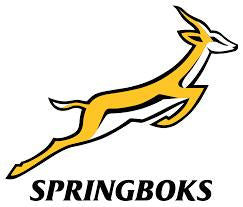
The South Africa national rugby union team has a history speckled with adversity yet culminating in an incredibly inspiring story. With an interspersed playing schedule due to apartheid regulations and anti-apartheid boycotts, the Springboks have fought through troubled times to become a source of pride for the South African nation. The organization emphasizes “the role of the sport and the country’s national teams in encouraging patriotism and instilling national pride in people from all walks of life” (Springboks.rugby, 2020, About Us, para. 3). Its “We are still #STRONGERTOGETHER” expression alludes to the 1995 World Cup championship team whose slogan, “one team, one country,” illustrated a first step toward unifying a divided nation. Today, the Springboks represent the entire South African nation as a commanding force on the Rugby world stage.
Stronger Together Springbok videos:
The Boks to South Africa: We are #StrongerTogether

1862 South Africa’s first official rugby match is played in Cape Town between the Army and the Civil service.
1891 SA plays in their 1st international test match against a British Isles touring team
1906-1907 South Africa fields its first national rugby team on a tour of the British Isles. It is at this time that the team is first referred to as the Springboks, a native antelope of SA. Paul Roos, tour captain, chose the name to prevent the British press from inventing their own name.
By WWI, SA is one of the top 2 powerhouses in the rugby world.
1985 - 1991 Due to anti-apartheid sporting boycotts of South Africa, the Springboks do not play a single test match against an established country. The team is banned from playing in the 1987 and 1991 World Cups.
1990-91 Apartheid is abolished
1992 Springboks are readmitted to international rugby
1995 South Africa, now a democratic nation, hosts the World Cup tournament, an event which becomes integral in the healing of a nation.
The Springboks enter the tournament ranked 9th, fight their way to the finals, and defeat the All Blacks 15–12 in extra-time. The victory is one of the greatest sporting moments in the country’s history, not just athletically but emotionally. Its significance in uniting a post-Apartheid nation is undeniable. Nelson Mandela, the country’s first black president and Francois Pienaar, captain of the predominantly white team, use the tournament as an opportunity to bond South Africans by giving citizens of all color a common goal to rally around. The slogan, “one team, one country”, represents a first step in mending racial divisions caused by apartheid.
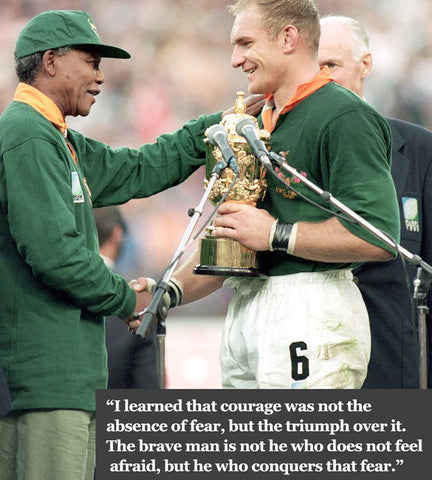
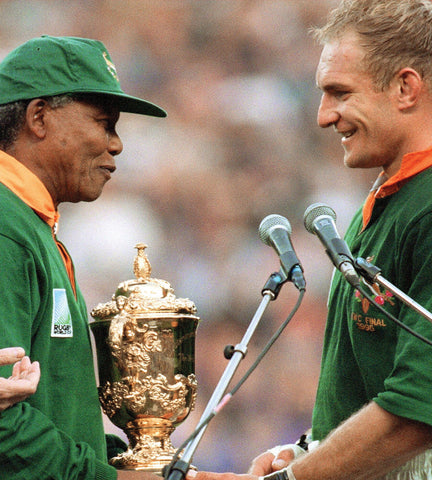
President Nelson Mandela, wearing Springbok apparel, presents the trophy to captain Francois Pienaar. A demonstration that color lines can be broken.
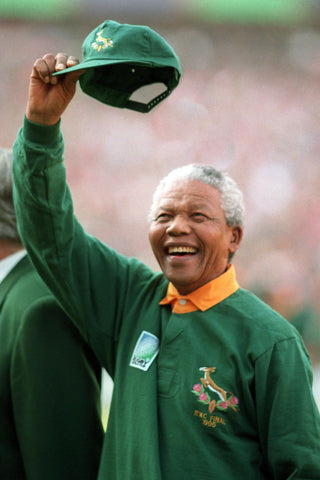
Since 1995 the Springboks have continue to promote national unity and the sport of rugby throughout the country. The organization holds coaching clinics for the country’s underprivileged youth and has drastically increased funding for disadvantaged rugby organizations. As well, the number of black South Africans representing the Springboks on the world stage has increased substantially from the 1995 World Cup team whose sole player was Chester Williams.
2007 SA defeats England in the finals to win the World Cup for a 2nd time
2008 SA named World Team of the Year at the Laureus World Sports Awards.
2019 Springboks win the World Cup for the 3rd time, defeating England in the finals. Siya Kolisi becomes the first Black South African rugby captain to lift the Webb Ellis Cup.
2020 Springboks are named the World Team of the Year at Laureus World Sports Awards

The Springboks play in green and gold jerseys with white shorts, and their emblems are the Springbok, a native antelope, worn on the right chest and the Protea, South Africa's national flower, worn on the left chest. The Protea was added to the jersey after the demise of apartheid as a neutral symbol of diversity, representing a decisive break from the past.
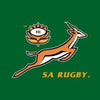
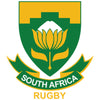
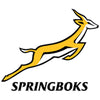
Reference:
https://www.springboks.rugby/en/pages/about-us
https://en.wikipedia.org/wiki/South_Africa_national_rugby_union_team
